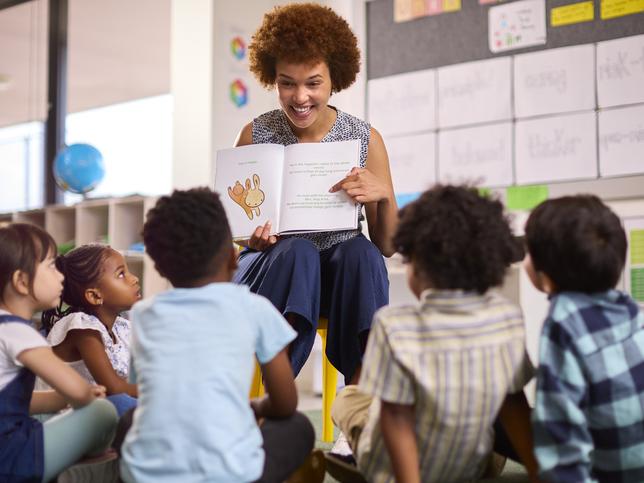
An on-campus primary school helped to enrich the community and embed social responsibility
Establishing a university primary school made a difference in the local area and sparked a sense of social responsibility in students. Andrew Lenehan explains how he did it

Now more than ever, students are keen to make the world a better place. They rail against the inequalities in our society and are motivated to abolish them. Many are angry that educational attainment appears to be a postcode lottery and not a meritocracy. I set out to put this theory to the test.
The overarching dream, or the big idea, was to establish a university primary school every Saturday morning. Children would flock to us from the surrounding areas each week and our students would sign up in their droves to be class teachers. Undergraduates from a range of courses would volunteer to be teaching assistants. We would call it Children Without Limits.
- THE Awards 2024 spotlight: learn from the best in UK and Irish higher education
- Fostering student co-creation to give back to the community
- From cohort to community: how to support student-led initiatives
The mood hoovers and the energy sappers warned me that I was being too ambitious. “The students won’t come to campus on a Saturday,” I was told. The children “will be too busy watching cartoons and going to dance lessons” was another particularly memorable assertion from a critical friend.
Buoyed by this positivity, I set the target of persuading 100 children to attend each week. This would rely on five students wanting to be class teachers and a further 20 students volunteering as teaching assistants. The thought of six-year-olds on campus began to give me sleepless nights. I worried about not being able to deliver the vision and I worried about the implications of getting it wrong. Sadly, I worried most about looking like a complete fool in front of colleagues if it failed. I had staked my reputation on something with a lot of variables – and I knew it.
Thankfully, we were all wrong. Children Without Limits now welcomes 500 children every Saturday morning to our campus for maths and English lessons. A whopping 300 Manchester Metropolitan University students sign up to be part of the hottest ticket in town. Our students are flourishing as they develop the softer skills that employers crave. The children bounce on to campus each week with excitement, along with their parents, who now realise that a university education is not just a pipe dream for their loved ones.
Understand the community you’re engaging with
There are two distinct stages to making Children Without Limits a success. It’s vital to ensure that communities engage and that attendance stays high. Regular visits to each school really help. Headteachers target the children that will benefit the most and the subjects that they want us to teach. Year 2 and Year 6 are always popular because these are the children that take the SAT exams. Poor performance could trigger an Ofsted inspection – so the stakes are high for schools.
Teachers are recruited from our primary education cohort through a competitive application process. Students are invited to upload a video application before an assessment centre. We then visit undergraduate lectures to create a buzz. Students sign up and attend training on standards and safeguarding, followed by DBS checks. Each teacher is then allocated around six teaching assistants for the year and can start to plan lessons for the children’s arrival in early November.
Many of the 12 partner schools from within a mile of our campus have about 70 per cent of their children in receipt of pupil premium grant. These are children that are eligible for free school meals. In stark contrast, in a leafy suburban primary school, just three miles from our campus, there are no children falling into this category.
Create a level playing field on the game of life
The opportunities that wealthier children have in comparison with their less-well-off peers have a profound impact at GCSE and A level. We know that children from disadvantaged backgrounds are less likely to compete at all stages of their schooling. Children Without Limits aims to narrow attainment gaps and create a level playing field for all. Many children start the game of life already two-nil down at half-time. By working together, we can change this.
Children Without Limits was devised to support the community and develop employability skills in graduates. There have also been some fantastic unintended consequences including our partnership with Chester Zoo and the National Nature Park. Teachers receive extensive training to qualify as Nature Champions. This then permeates across the region into schools as they graduate and drive the sustainability agenda.
The burning question must be: would I do it again knowing what I know now? The answer is a resounding yes. You will need to have resilience at times, but the impact you will witness makes it all worthwhile. You will have to accept that there will be setbacks along the way and sometimes people will not see what you’re trying to do. I learned, however, not to underestimate others. When it comes to doing the right thing, it’s actually quite easy to mobilise large groups of people.
Our students are the decision-makers of the future. Armed with an ethos of social responsibility, they can make a significant footprint in the local community.
Andrew Lenehan is student enrichment manager at Manchester Metropolitan University. The university was shortlisted in the Outstanding Contribution to the Local Community category in the 2024 THE Awards. A full list of nominees can be found here.
If you would like advice and insight from academics and university staff delivered direct to your inbox each week, sign up for the Campus newsletter.


